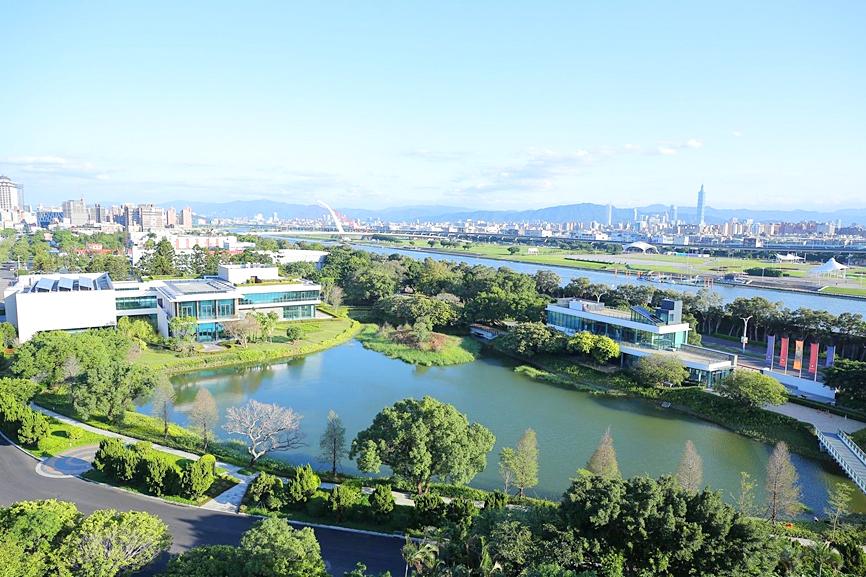The Taipei City Government is glorifying authoritarianism with today’s opening of a heritage site to honor former president Chiang Ching-kuo (蔣經國), the Transitional Justice Commission said yesterday.
The Ching-kuo Chi-hai Cultural Park (經國七海文化園區) in Taipei’s Dazhi (大直) area, jointly built and operated by the city government and the Chiang Ching-kuo Foundation for International Scholarly Exchange, features Chiang’s diaries and paintings, among other items.
The site’s installations do not address Chiang’s role in the White Terror era, the commission said, adding that the city should rename or redesign the park.

Photo courtesy of the Taipei Department of Cultural Affairs
Citing its own report from September last year, the commission said that during the White Terror era Chiang was head of records at the Presidential Office’s special affairs department and director of political warfare at the Ministry of National Defense, posts that were at the top of the nation’s security and intelligence apparatus.
Chiang was fully cognizant of the government’s White Terror operations and a participant in its perpetration before he became president, it said.
Chiang’s actions harmed numerous Taiwanese, and the power he wielded was never granted through a democratic process, it said.
After becoming president, he orchestrated a policy of branding dissidents as communist spies, while avoiding the kind of direct interference in military tribunals like his father, Chiang Kai-shek, it said.
The persecution of dissidents Yu Teng-fa (余登發), Tsai Yu-chuan (蔡有全) and Hsu Tsao-te (許曹德), and the killing of writer Chiang Nan (江南) in the US occurred under Chiang Ching-kuo’s administration, it said.
Chiang Ching-kuo supervised the persecution of dissidents during the Kaohsiung Incident of 1979, writing in his diary that he intended to “make a clean sweep [of his enemies] and then tear them out by the root,” the commission said.
The government is also suspected to be responsible for the unsolved murders of veteran democracy advocate Lin I-hsiung’s (林義雄) mother and two daughters, and the suspicious death of democracy advocate Chen Wen-chen (陳文成), which both occurred despite being under police surveillance, it said.
Chiang Ching-kuo viewed elections — which he begrudgingly permitted under international pressure — as a waste of time and money, the commission said.
The commission said that the park qualifies as an authoritarian symbol under the Act on Promoting Transitional Justice (促進轉型正義條例) and should be dealt with as such, it said.
The city government’s statements in support of the park — which credited Chiang Ching-kuo with ending the Martial Law period, initiating liberal reforms, and building the nation’s economy and culture — are not accepted by the commission, it said.
The city government said that the commission is “imposing political correctness” on history and that the city has handled the project to revitalize Chiang Ching-kuo’s former residence in a manner that respected his historical context.
Additional reporting by Yang Hsin-hui

Taipei, New Taipei City, Keelung and Taoyuan would issue a decision at 8pm on whether to cancel work and school tomorrow due to forecasted heavy rain, Keelung Mayor Hsieh Kuo-liang (謝國樑) said today. Hsieh told reporters that absent some pressing reason, the four northern cities would announce the decision jointly at 8pm. Keelung is expected to receive between 300mm and 490mm of rain in the period from 2pm today through 2pm tomorrow, Central Weather Administration data showed. Keelung City Government regulations stipulate that school and work can be canceled if rain totals in mountainous or low-elevation areas are forecast to exceed 350mm in

EVA Airways president Sun Chia-ming (孫嘉明) and other senior executives yesterday bowed in apology over the death of a flight attendant, saying the company has begun improving its health-reporting, review and work coordination mechanisms. “We promise to handle this matter with the utmost responsibility to ensure safer and healthier working conditions for all EVA Air employees,” Sun said. The flight attendant, a woman surnamed Sun (孫), died on Friday last week of undisclosed causes shortly after returning from a work assignment in Milan, Italy, the airline said. Chinese-language media reported that the woman fell ill working on a Taipei-to-Milan flight on Sept. 22

COUNTERMEASURE: Taiwan was to implement controls for 47 tech products bound for South Africa after the latter downgraded and renamed Taipei’s ‘de facto’ offices The Ministry of Foreign Affairs is still reviewing a new agreement proposed by the South African government last month to regulate the status of reciprocal representative offices, Minister of Foreign Affairs Lin Chia-lung (林佳龍) said yesterday. Asked about the latest developments in a year-long controversy over Taiwan’s de facto representative office in South Africa, Lin during a legislative session said that the ministry was consulting with legal experts on the proposed new agreement. While the new proposal offers Taiwan greater flexibility, the ministry does not find it acceptable, Lin said without elaborating. The ministry is still open to resuming retaliatory measures against South

1.4nm WAFERS: While TSMC is gearing up to expand its overseas production, it would also continue to invest in Taiwan, company chairman and CEO C.C. Wei said Taiwan Semiconductor Manufacturing Co (TSMC) has applied for permission to construct a new plant in the Central Taiwan Science Park (中部科學園區), which it would use for the production of new high-speed wafers, the National Science and Technology Council said yesterday. The council, which supervises three major science parks in Taiwan, confirmed that the Central Taiwan Science Park Bureau had received an application on Friday from TSMC, the world’s largest contract chipmaker, to commence work on the new A14 fab. A14 technology, a 1.4 nanometer (nm) process, is designed to drive artificial intelligence transformation by enabling faster computing and greater power